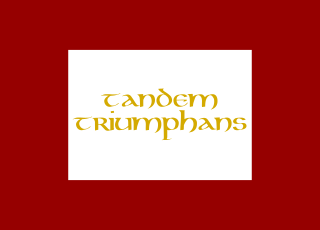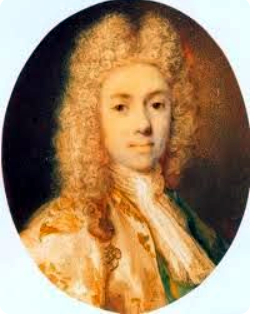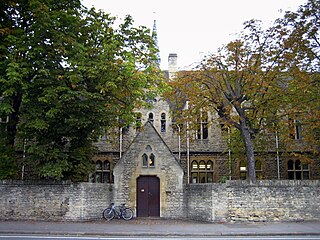
Jacobitism was the name of the political movement in Great Britain and Ireland that aimed to restore the House of Stuart to the thrones of England, Scotland, and Ireland. The movement was named after Jacobus, the Latin form of James.
Charles Leslie was a former Church of Ireland priest who became a leading Jacobite propagandist after the 1688 Glorious Revolution. One of a small number of Irish Protestants to actively support the Stuarts after 1688, he is best remembered today for his role in publicising the 1692 Massacre of Glencoe.

Duncan Forbes of Culloden was a Scottish politician and lawyer. As Lord President and senior Scottish legal officer, he played a major role in helping the government suppress the 1745 Jacobite Rising.

Sir George Lockhart of Lee, of Carnwath, South Lanarkshire, also known as Lockhart of Carnwath, was a Scottish writer, spy and politician.

Carnwath (Gaelic: A' Chathair Nuadh; English: "New Fort" is a moorland village on the southern edge of the Pentland Hills of South Lanarkshire, Scotland. The village lies about 30 mi south of both Edinburgh and Glasgow. It is bounded by the North Medwyn and South Medwyn watercourses.

Lord George Murray (1694-1760), sixth son of John Murray, 1st Duke of Atholl, was a Scottish nobleman and soldier who took part in the Jacobite rebellions of 1715 and 1719. Pardoned in 1725, he returned to Scotland, where he married and in 1739 took the Oath of Allegiance to George II.

John Drummond, 1st Earl of Melfort, styled Duke of Melfort in the Jacobite peerage (1649-1714), was a Scottish politician and supporter of James II, whom he joined in exile after the 1688 Glorious Revolution. He served as the first Jacobite Secretary of State but his personal unpopularity with other Jacobites led to his resignation in 1694. He failed to regain his former influence and died in Paris in 1714.
James Lockhart of Lee and Carnwath, Count Lockhart-Wishart (Wischeart) of the Holy Roman Empire was a Scottish aristocrat with a successful military career.

The Planned French Invasion of Britain, 1708, also known as the 'Entreprise d’Écosse,' took place during the War of the Spanish Succession. The French planned to land 5,000-6,000 soldiers in North-East Scotland to support a rising by local Jacobites that would restore James Francis Edward Stuart to the throne of Great Britain. Leaving Dunkirk in March 1708, the fleet reached Scotland but was unable to disembark the troops and returned home, narrowly escaping a pursuing British naval force.

The Jacobite rising of 1745, also known as the Forty-five Rebellion or simply the '45, was an attempt by Charles Edward Stuart to regain the British throne for his father, James Francis Edward Stuart. It took place during the War of the Austrian Succession, when the bulk of the British Army was fighting in mainland Europe, and proved to be the last in a series of revolts that began in 1689, with major outbreaks in 1708, 1715 and 1719.

The Manchester Regiment was a Jacobite unit raised during the 1745 Rebellion and the only significant number of English recruits willing to fight for Charles Edward Stuart in his attempt to regain the British throne. Raised in late November 1745, the majority were captured in December at Carlisle; eleven officers and sixteen members of the rank and file were executed in 1746, over a quarter of all those executed for their role in the Rising.
Christopher M. Tuckett is a British biblical scholar and Anglican priest. He holds the Title of Distinction of Professor of New Testament Studies at the University of Oxford and a Fellow of Pembroke College, Oxford.

The Jacobite rising of 1715, was the attempt by James Francis Edward Stuart to regain the thrones of England, Ireland and Scotland for the exiled House of Stuart.
Sir James Lockhart, Lord Lee was a Scottish courtier, politician and judge, a royalist commander of the Wars of the Three Kingdoms.

Paul Kléber Monod is a Canadian-born academic historian specializing in Jacobitism and British history in the 17th and 18th centuries. Since 1984 he has taught at Middlebury College, Vermont, where he is now A. Barton Hepburn Professor of History, and he is the author of a number of books and articles dealing with his period.
Murray G. H. Pittock FRSE is a British cultural historian, Bradley Professor of Literature at the University of Glasgow and Pro Vice Principal at the University, where he was previously Vice Principal, Head of the College of Arts and Dean from 2009 to 2015. He is currently engaged in leading on the Kelvin Hall development (kelvinhall.org.uk), the first phase of which was opened by the First Minister, Nicola Sturgeon, on 11 November 2016 and with other major projects on learning and teaching space and Glasgow's unique early career development programme.

William Murray, Marquess of Tullibardine was a Scottish nobleman and Jacobite who took part in the rebellions of 1715, 1719, and 1745.
When the king enjoys his own again is a Cavalier ballad written by Martin Parker during the English Civil War. It was later adopted by Jacobites. According to the historian Dr. Bernard Capp, this song was perhaps the most popular song in mid-seventeenth century England. The eighteenth century critic Joseph Ritson called it "the most famous and popular air ever heard in this country".

The Jacobite rising of 1719 or the Nineteen was a Spanish-backed landing in Scotland, originally planned as part of a larger rising in South-West England to restore James Francis Edward Stuart to the throne of Great Britain. Only the Scottish element took place and while there were a number of minor actions, defeat at the Battle of Glen Shiel in June effectively ended the Rising.
















